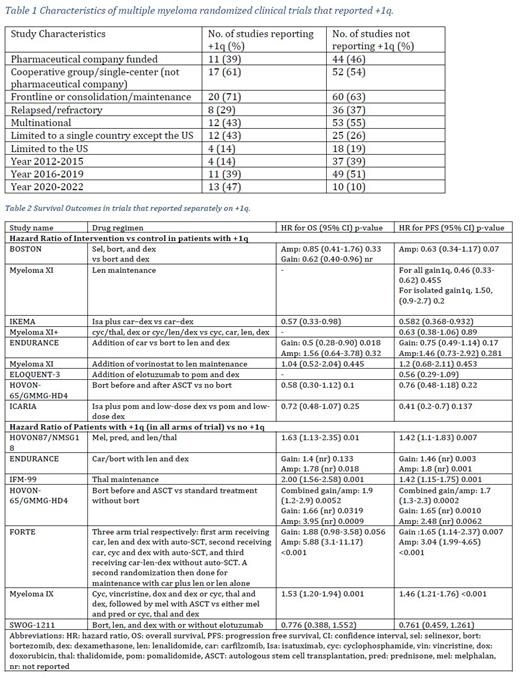Introduction:
Extra copies of chromosome 1q21 (+1q: gain=3 copies, amp=4 or more copies) have been associated with worse outcomes for patients with multiple myeloma (MM). We performed a systematic review to evaluate current reporting of +1q, efficacy of existing regimens for +1q, and prognostic implications of +1q in MM randomized controlled trials (RCTs).
Methods:
We searched three databases for MM RCTs. Our inclusion criteria were all published MM RCTs from 2012-2022. Each MM RCT was analyzed for reported data on +1q. The following features specific to +1q were collected: +1q reported or not as a high-risk cytogenetic alteration, definition of gain1q with respect to percentage of cells with abnormality detected, documentation of distinction between Gain1q and Amp1q in analysis, prevalence of +1q in enrolled population, outcomes of patients [Overall Survival (OS) and Progression Free Survival (PFS)] in patients with +1q in the experimental versus control arm and in patients with and without +1q.
Results:
A total of 124 trials were included. Among these trials, 28 (23%) studies reported data on +1q, including 26 studies that reported data in the primary manuscript and two studies that reported in separate publication. These trials reported a total of 2692 patients with +1q which represented 25% of all the patients enrolled. Out of 28 trials, three trials (11%) specified the criteria for categorizing patients as +1q (example in IKEMA and IFM-99: the presence of at least three copies in at least 30% of analyzed plasma cells was required). Only four trials (14%) reported survival data on gain and amp separately and the remaining 24 (86%) studies reported for gain or did not specify gain vs amp. Amongst the trials that reported +1q, 22 (79%) considered this to be a high-risk cytogenetic abnormality.
Amongst trials that met primary endpoint showing improvement in PFS and clearly reported on +1q, the following drugs also improved PFS for those with +1q (when comparing hazard ratio (HR) for intervention versus control arm in the +1q subgroup): lenalidomide (len) maintenance in Myeloma XI, selinexor in BOSTON, and isatuximab in IKEMA and ICARIA.
Several trials met their endpoint and showed improvement in PFS in the +1q cohort in same direction as overall study results but had confidence intervals for +1q subgroup that crossed 1. These included addition of carfilzomib in Myeloma XI, addition of carfilzomib vs bortezomib to len and dex for +1q (but not in Amp1q) in ENDURANCE, addition of elotuzumab to pomalidomide and dex, and bortezomib-based treatment before and after autologous stem cell transplantation (auto-SCT) vs no bortezomib (Table 2).
Seven studies reported HR for patients with +1q in the trial (across both arms) compared to those without. In six studies (all studies other than SWOG1211), worse outcomes were seen with respect to OS and PFS for those with +1q versus without (Table 2).
Important interventions for which subgroup analysis of +1q was not presented in trial results, and hence conclusions about the efficacy of the drugs specifically for patients with +1q cannot be ascertained included pomalidomide and ixazomib. Although subgroup analysis of various daratumumab trials has shown improvement for high-risk MM, the effect on gain1q was not isolated. Two recent contemporary trials that isolated effect of auto-SCT (DETERMINATION and IFM-2009) did not report +1q. However, in FORTE Trial, adverse prognostic implications of +1q were not seen in the arm receiving carfilzomib, len, dex and auto-SCT, indicating a possible role of carfilzomib and auto-SCT in ameliorating the adverse prognostic implications of +1q. Although len maintenance improved PFS after auto-SCT as maintenance in Myeloma XI overall for those with +1q, it did not appear to improve PFS for patients with isolated +1q (with no other concurrent genetic abnormalities).
Conclusion:
This systematic review of MM RCTs finds considerable heterogeneity in the reporting of +1q abnormalities in the literature, and +1q to be inconsistently classified as a poor prognostic factor in subgroup analysis of randomized myeloma trials. Most interventions that have shown to be successful in randomized trials and have clearly reported on the +1q subgroup have shown concordant direction of results and benefit of the applied intervention in the +1q subgroup. A more standardized approach to reporting of this abnormality is needed.
Disclosures
Fonseca:FISH: Patents & Royalties: FISH; Millenium: Consultancy; Caris Life Sciences: Membership on an entity's Board of Directors or advisory committees; Kite: Consultancy; AZBio: Membership on an entity's Board of Directors or advisory committees; Takeda: Consultancy; Merck: Consultancy; Janssen: Consultancy; Bayer: Consultancy; Binding Site: Consultancy; Antegene: Membership on an entity's Board of Directors or advisory committees; Pfizer: Consultancy; BMS (Celgene): Consultancy; Sanofi: Consultancy; Regeneron: Consultancy; Pharmacyclics: Consultancy; Juno: Consultancy; Aztrazenica: Consultancy; Oncotracker: Membership on an entity's Board of Directors or advisory committees; Adaptive Biotechnologies: Membership on an entity's Board of Directors or advisory committees; AMGEN: Consultancy; Adaptive Biotechnologies: Consultancy; AbbVie: Consultancy. Sborov:Abbvie: Consultancy; BMS: Consultancy; Pfizer: Consultancy, Research Funding; Bioline: Consultancy, Research Funding; Arcellx: Consultancy, Research Funding; Gilead: Research Funding; Amgen: Research Funding; Cantex: Research Funding; Sanofi: Consultancy, Research Funding; Janssen: Consultancy, Research Funding; GSK: Consultancy, Research Funding; RocheX: Research Funding. Mohan:Institutional KL2 Award: Other: Research Grant; Takeda Pharmaceutical Company: Research Funding; GlaxoSmithKline plc: Research Funding; MJH life sciences: Honoraria; Ionis Pharmaceuticals: Research Funding; Bristol-Myers Squibb Company: Research Funding; Celgene Corporation: Research Funding; Novartis: Research Funding; Amgen Inc: Research Funding; Blood Cancer Today: Honoraria; MashupMD: Honoraria; Sanofi S.A: Consultancy, Research Funding. Mian:GSK Awards: HHS Research Early Career Award from Hamilton Health Sciences Foundation: Honoraria; Sanofi: Honoraria; Takeda: Honoraria; Amgen: Honoraria; Celgene: Honoraria; Janssen: Honoraria. Chakraborty:Adaptive Biotechnologies: Consultancy; Sanofi Pasteur: Consultancy; Janssen: Consultancy.


